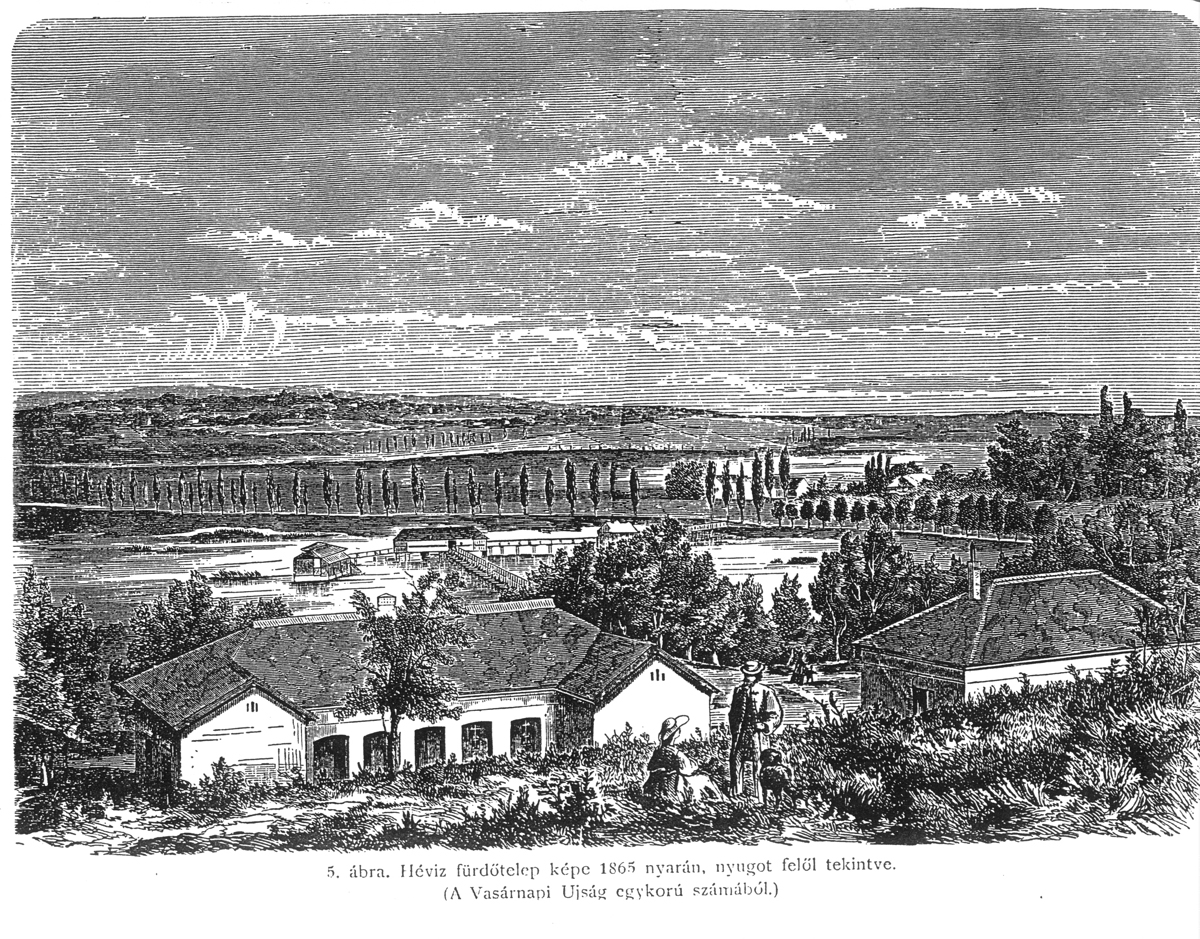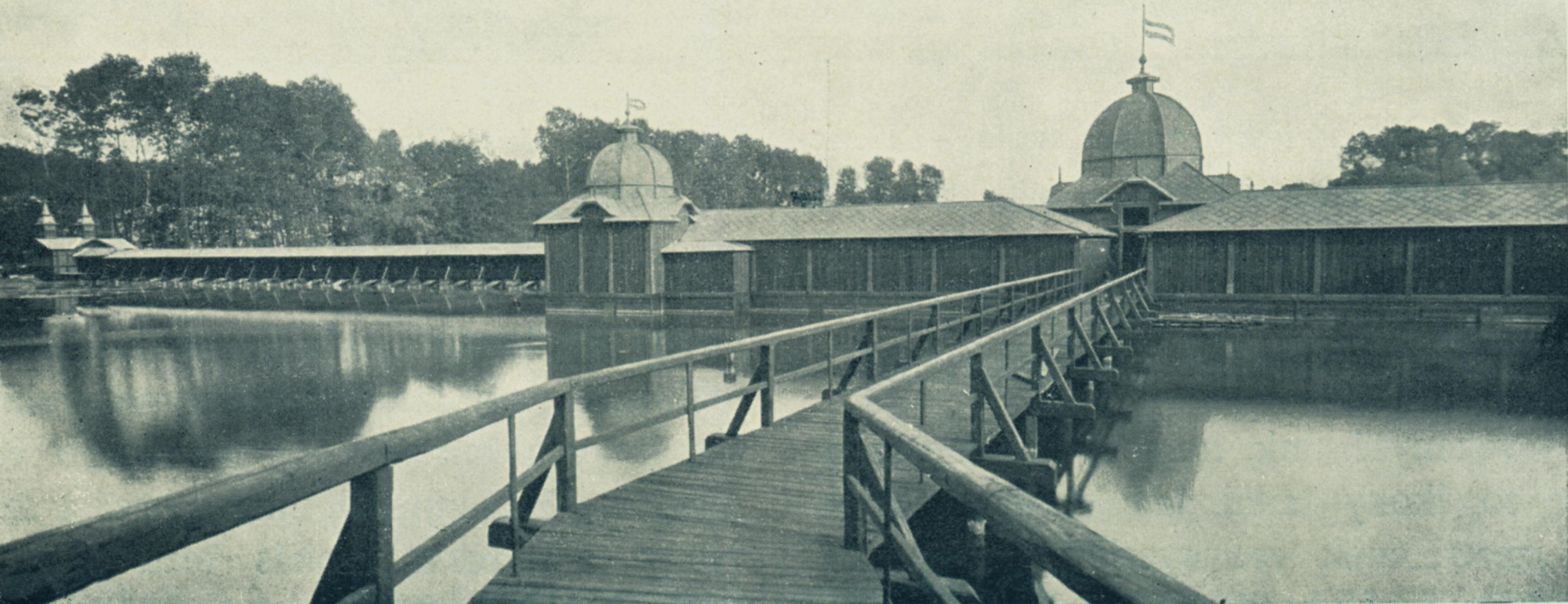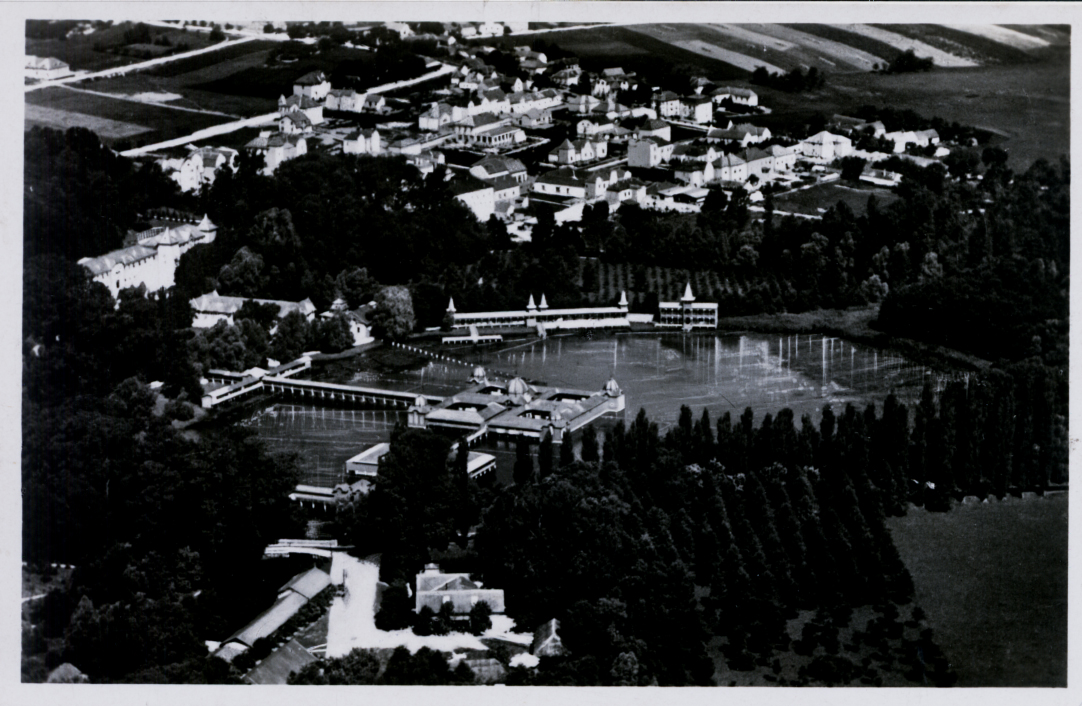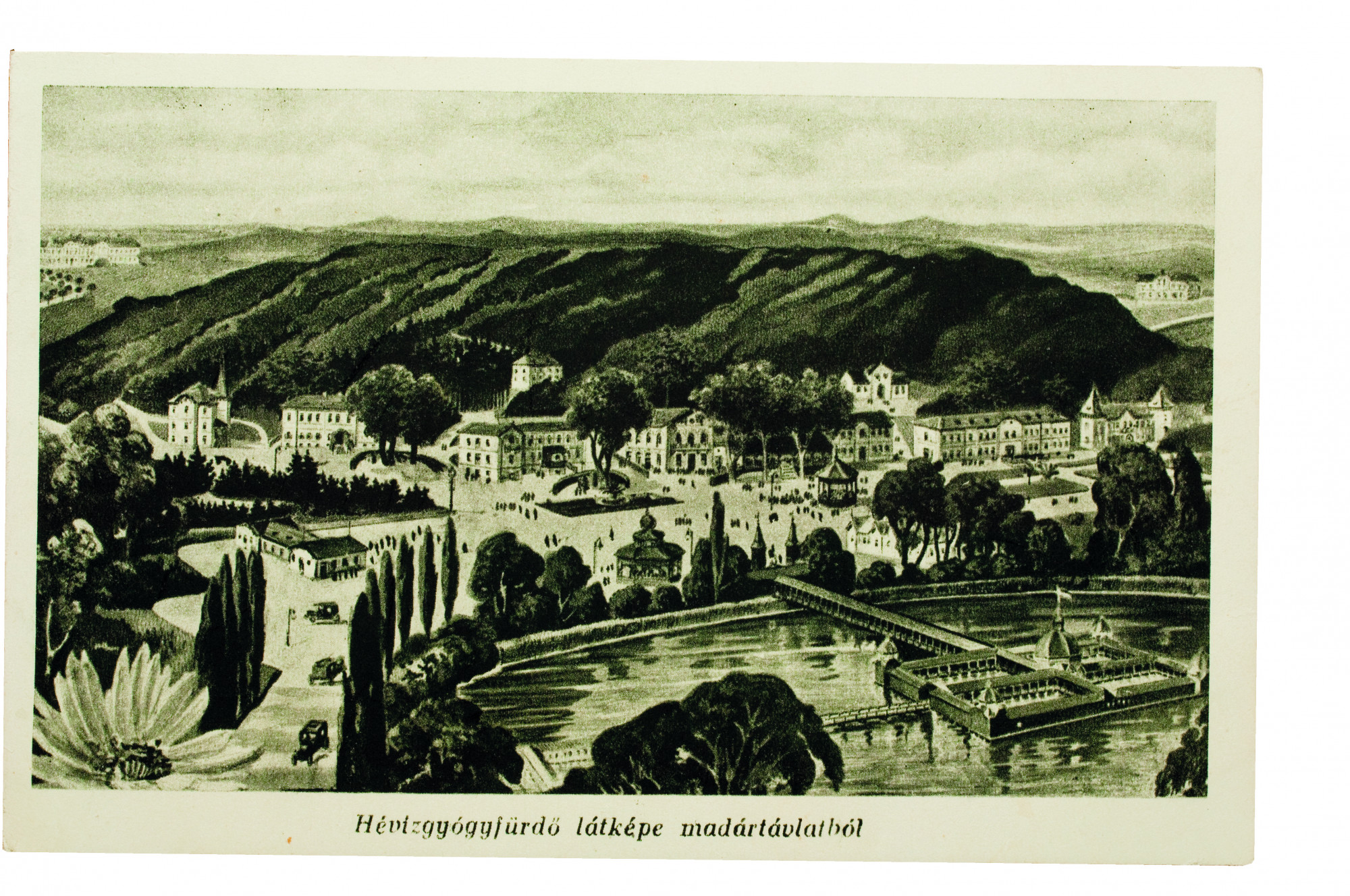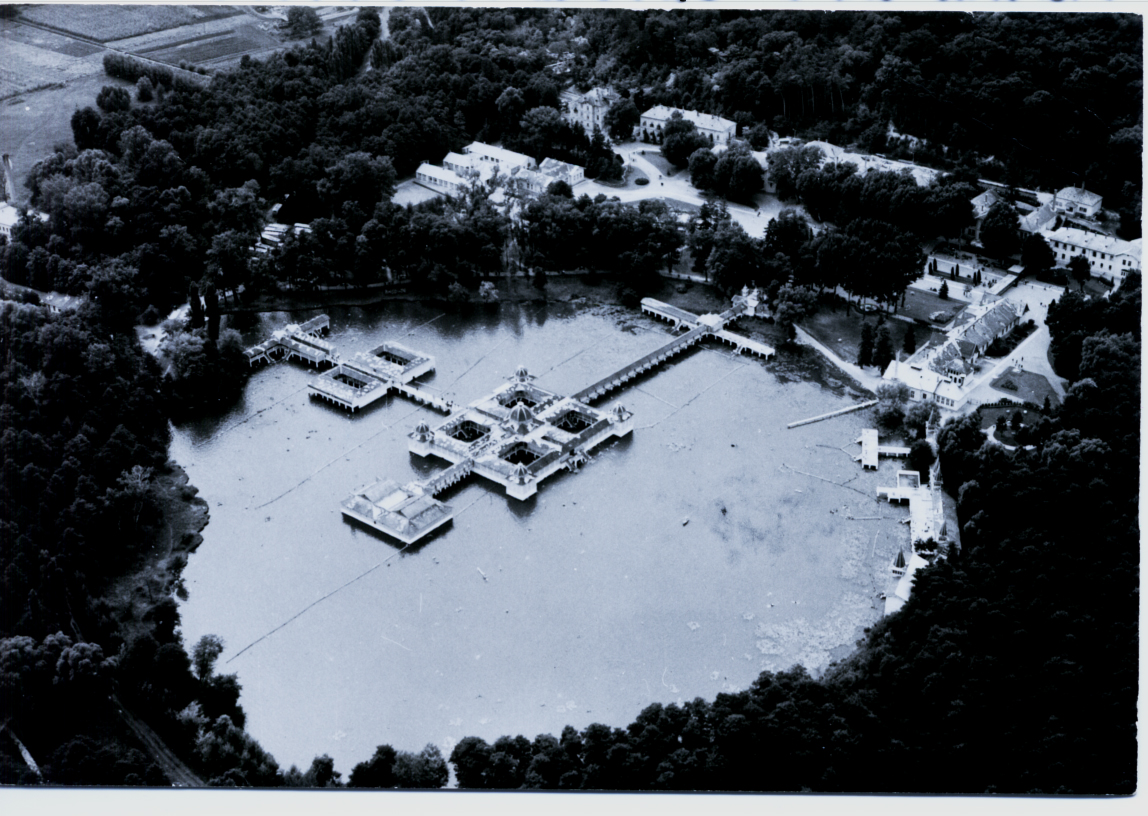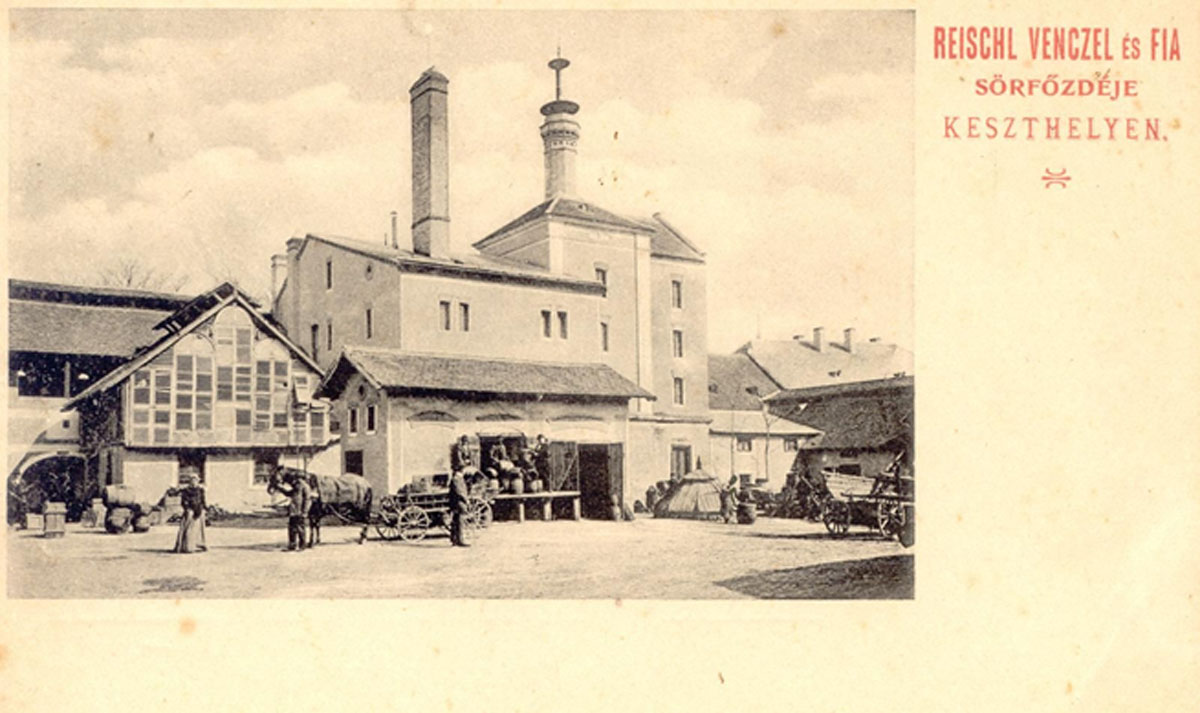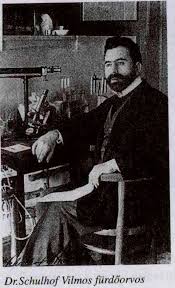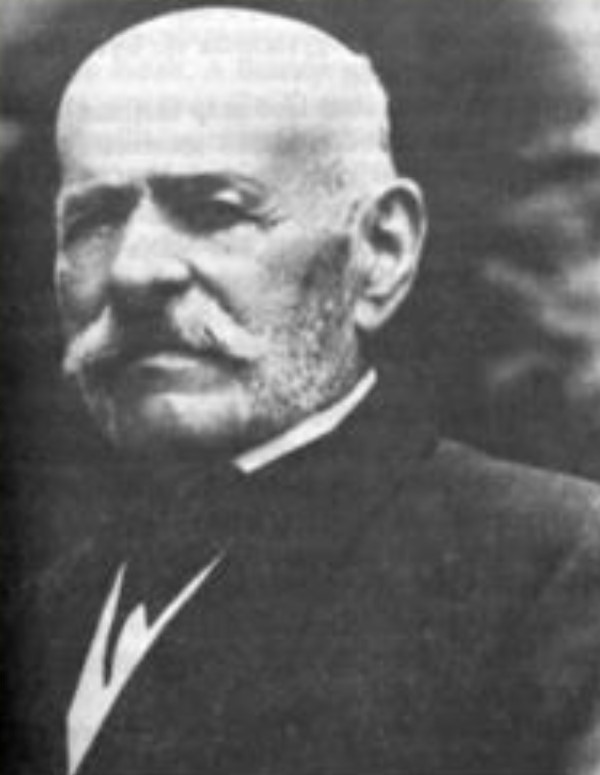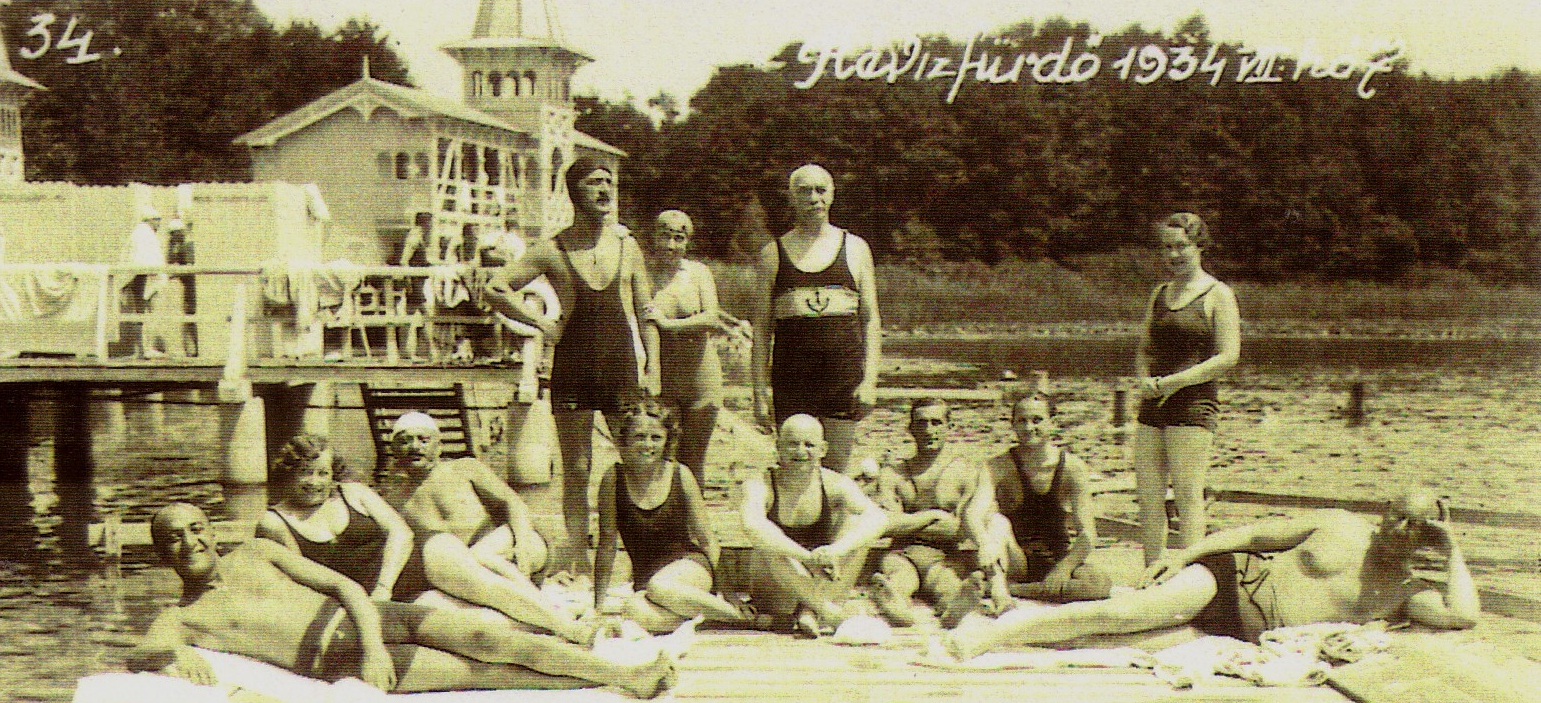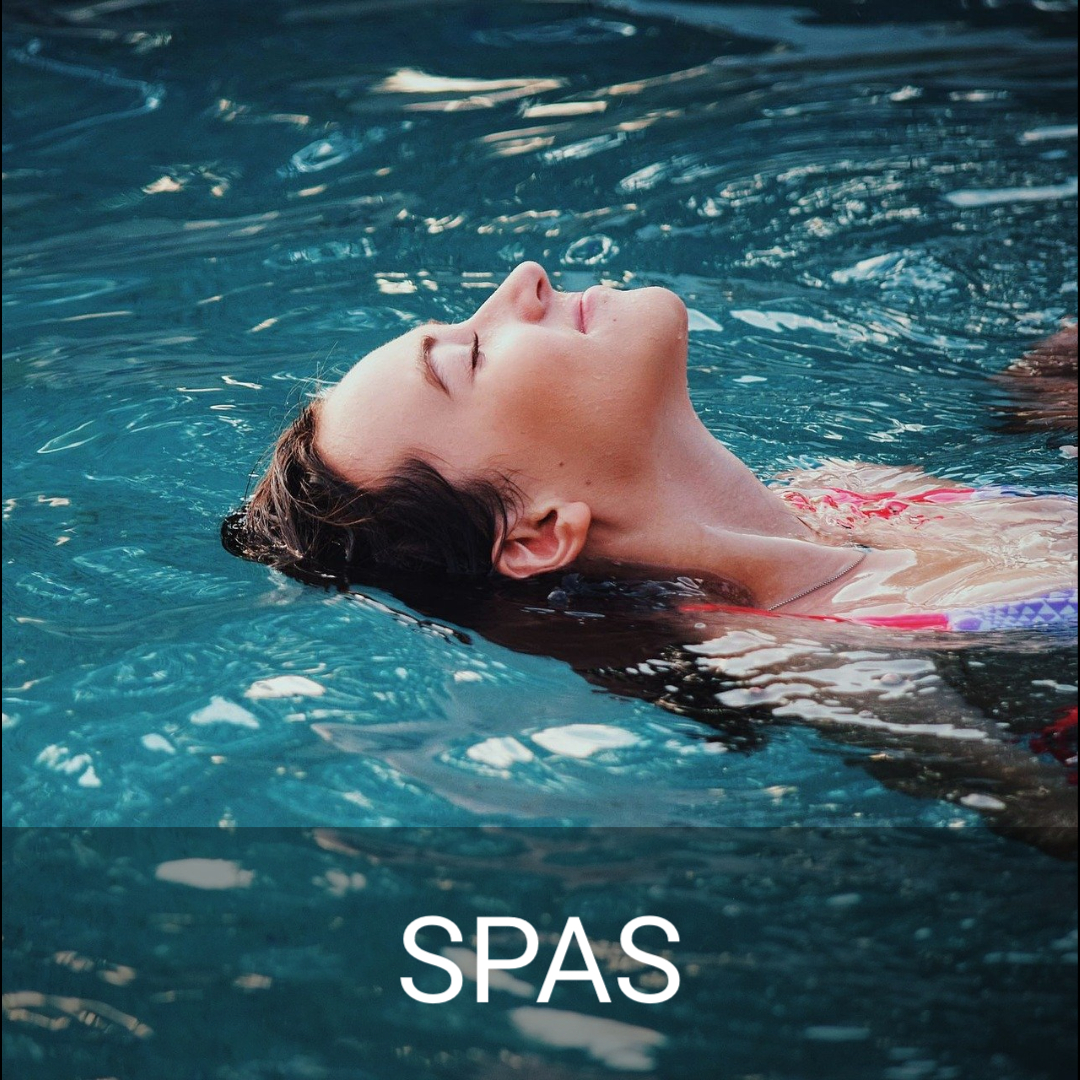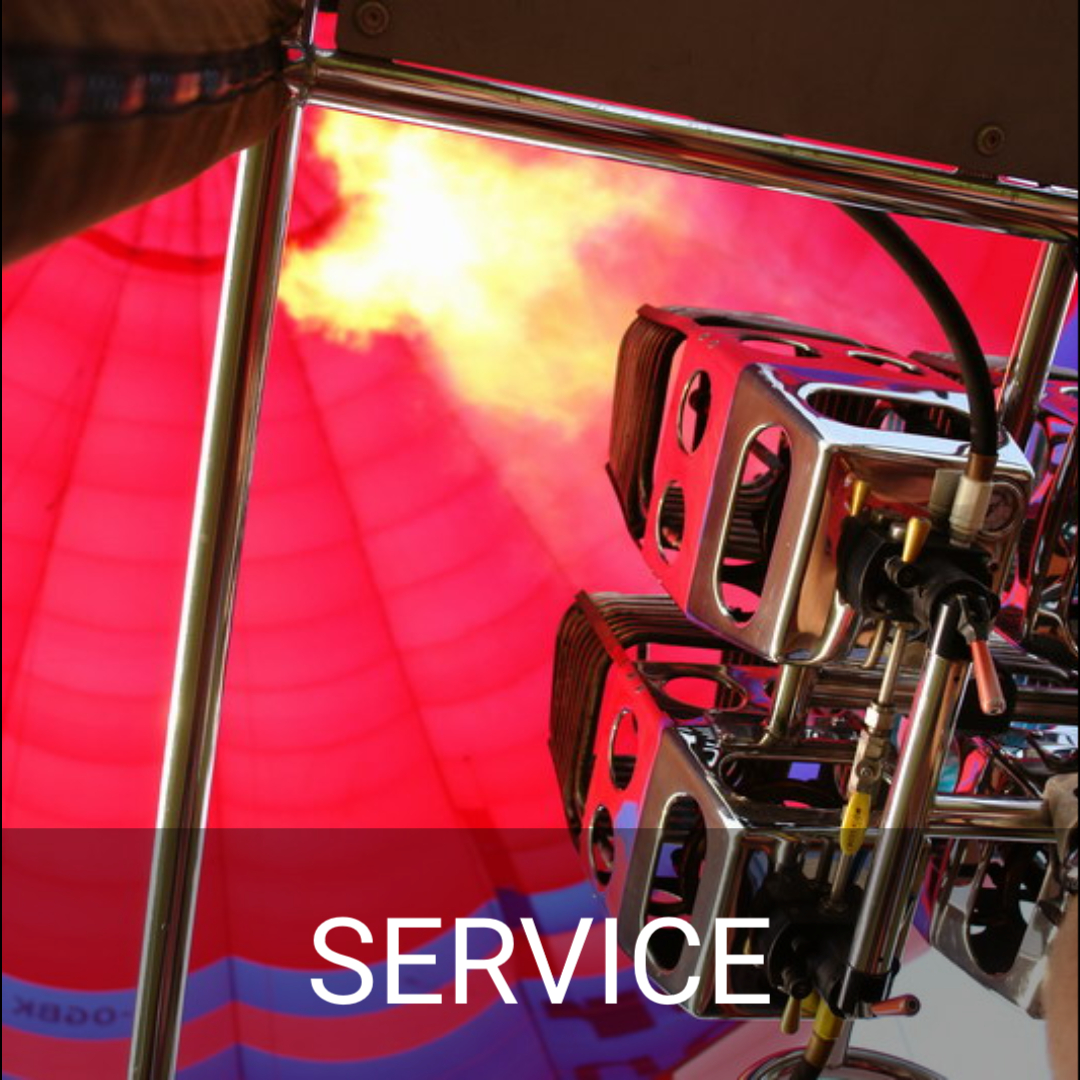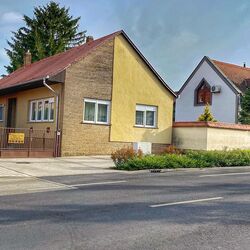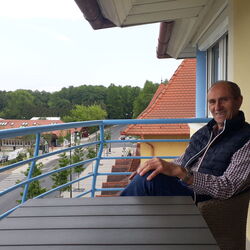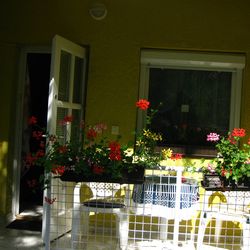Everything you need to know about the past and present of Lake Hévíz and the Lake Baths. Facts, figures, interesting stories
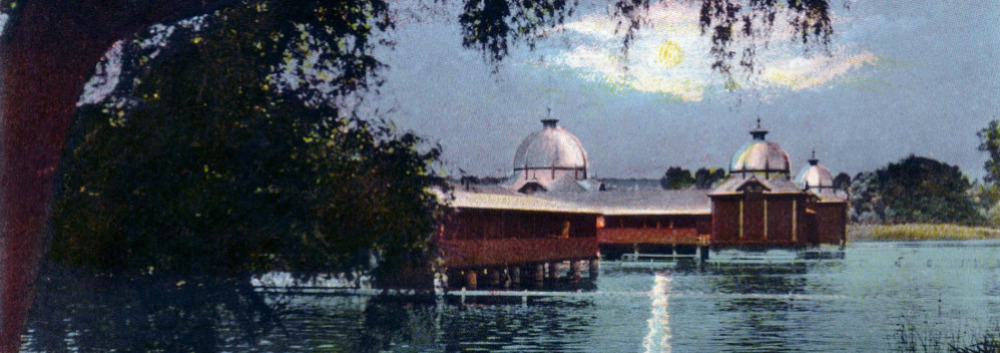
The history of one of the oldest thermal spas in Hungary from the first piles being driven into the earth to the turn of the millennium...


DR KÁROLY MOLL
1889 Simaság - 1982.
Hévíz / He received his medical degree in 1913 and worked in Hévíz from 1920. He was a member of several professional organisations of national importance and, in 1927, he organised the first rheumatism department in the Hospital of the Hungarian State Railways in Budapest. In 1932, he was appointed chief spa physician in Hévíz, and in 1952, he became head of the department of the State Spa Hospital. He was also deputy director of the institution until his retirement in 1968. He was awarded the title of Honorary Citizen of Hévíz for a good reason. His work, research activities, and professional successes contributed greatly to the recognition of Hévíz medicine both in Hungary and abroad. In addition to the discovery of the weight baths, he is also credited with the creation of the currents map of Lake Hévíz. More than 50 of his publications were published in scientific journals. His wife, Dr Ilona Hoffmann (1908-2008), was the first female rheumatologist at the spa and a worthy professional partner in his work.
Dr Károly Moll is commemorated by a statue in Hévíz and a memorial room in the hospital, which is decorated with the renowned spa physician's medical equipment and objects. Their daughter, Dr Veronika Moll has a practice in Hévíz also as a rheumatologist.
DR VILMOS SCHULHOF and DR ÖDÖN SCHULHOF
1874. Budapest - 1944. Auschwitz and 1896. Budapest - 1978. Budapest
Vilmos Schulhof, after whom the promenade in front of the hospital was named, completed his studies in Budapest and later trained as a doctor in Berlin. He first worked at the St. Lukács Spa in Budapest, then, in 1905, he moved to Hévíz where he worked as a spa physician and then as the head physician of the sanatorium until 1944. His work was of outstanding importance in promoting Hévíz as a spa resort. He did much to improve medical treatments, one of the most important elements of which was the foundation of the Zander Institute in 1911 (such an institute existed only in Karlsbad). The Zander method is based on the use of machines to help with therapeutic gymnastics, i.e. machines help patients, who have difficulty with it, to move parts of the body during physiotherapy. With the introduction of these methods, he made a great step towards helping patients with very limited mobility to recover. In 1927, he published a book in the German language, in which he described the medicinal properties of Hévíz in detail, and, in 1937, his book Hévízgyógyfürdő (Hévíz Spa) was published, in which he summarized his decades of experience as a spa physician. His credo was that “experience is superior to knowledge”. Unfortunately, his recognition and expertise did not save him and his wife from being deported from the Keszthely ghetto to Auschwitz in 1944. His work was continued by his half-brother Ödön Schulhof (1896-1978), who was 22 years younger than him and fortunately was not in town at the time of the deportation. As a rheumatologist and physiotherapist, he was responsible for diagnostic examinations. However, he also carried out research, for example on the effects of the hydrostatic pressure of water and the biological effects of mud wraps in treatments. His so-called "insight" bone x-ray images became world-famous. He worked until 1948 in Hévíz, then, in 1949, he moved back to Budapest, where he became director of the National Research Institute of Balneology. Generations of rheumatologists grew up under his guidance as he taught, and wrote the first textbook on rheumatology, this time in the Hungarian language. During his time in Hévíz, X-ray examinations and electrotherapy treatments were also introduced in Hévíz Spa.

Emperor, poet, actor... or internationally wanted terrorist? Who were the most famous visitors in Hévíz?
After Count György Festetics built the first spa building in Hévíz in 1795, the spa quickly became famous in Hungary and abroad. In the late 19th and early 20th century, more and more famous visitors came to Hévíz to relax and recuperate.
Several famous Hungarian writers and poets took spa treatments in Hévíz or were visitors of the town: Mihály Csokonai Vitéz, Sándor Kisfaludy, Dániel Berzsenyi, Károly Eötvös, Pál Gyulai, Attila József, Áron Tamási, Gyula Illyés, Lőrinc Szabó, Zsigmond Móricz.
Many people from the world of art also visited Hévíz, such as Mari Jászai, Sári Sebők, Erzsi Sándor, Ferenc Székelyhidi, Karola Szalai, Endre Nagy, Gyula Saphir.
Several members of the royal family also travelled to Hévíz. The guest list also includes the name of Crown Prince Franz Ferdinand, who was the guest of Prince Tasziló Festetics. Archduke Joseph and his wife Archduchess Augusta also paid a visit to Hévíz.
Researchers, scientists and politicians also came to Hévíz: József Eötvös, Ferenc Pulszky, Kálmán Szél, and Kálmán Kittenberger, Béla Lengyel, Dr Gyula Weszelszky.
The famous Estonian playwright Eduard Wilde spent his holiday in Hévíz too.
Infamous guests from the political elite of the second half of the 20th century: In the 70s and 80s, several prominent Hungarian and foreign people stayed in Hévíz for holidays and spa treatments in complete secrecy, of course. There certainly are guests whose names are shrouded in mystery to this day. However, it is certain that Fred Sinowatz, who became Chancellor of Austria in 1983, visited Hévíz in 1982. Also in the 1980s, the leadership of the East German secret service (Stasi) arrived in Hévíz several times. The delegation usually consisted of 20-25 men and two accompanying women. On these occasions, they were usually accompanied by the head of the Stasi, Markus Wolf, the 'faceless man'. And in September 1984, none other than the Venezuelan-born "Carlos", better known as the "Jackal", the most feared terrorist of the Cold War, wanted also by Interpol, stayed in Hévíz. It was not the only time that the Jackal visited Hévíz and Hungary. In the first half of the 1980s, he met here the head of the Stasi several times, among others. All these guests stayed in the sanatorium of the Ministry of the Interior as it was protected by the military.
Less infamous but rather internationally renowned guest of Hévíz was the South African heart surgeon Professor Christian Barnard, who performed the first heart transplant in 1967. In June 1993, the 14th Dalai Lama Tendzin Gyaco arrived for the inauguration of the Peace Stupa in Zalaszántó and stayed in one of the buildings of the Hunguest Hotels.
János Kádár stayed in Hévíz on two occasions, in 1970 and 1972 but the only thing people knew about his visits was that the building of the BM Sanatorium in Kossuth Street was under constant police surveillance. Op-art artist Victor Vasarely and astronaut Bertalan Farkas stayed in Hévíz on several occasions. The Kossuth Prize-winning composer György Ránki composed his Cain and Abel during his holiday in Hévíz.
The most famous four-legged guest, Nelly, the elephant
In 1913, circus director Mátyás Beketow presented a young elephant to the zoo because he felt that the animal, who had a bad leg, would not be suitable for working in the circus. Dr Emil Raitsits, the Zoo's veterinarian, examined the elephant Nelly thoroughly and diagnosed her with incipient rheumatism. The zoo's management decided to help Nelly's rheumatism with a spa treatment, so to the great pleasure of the people of Hévíz, she was treated at the Lake Baths in Hévíz for several months.
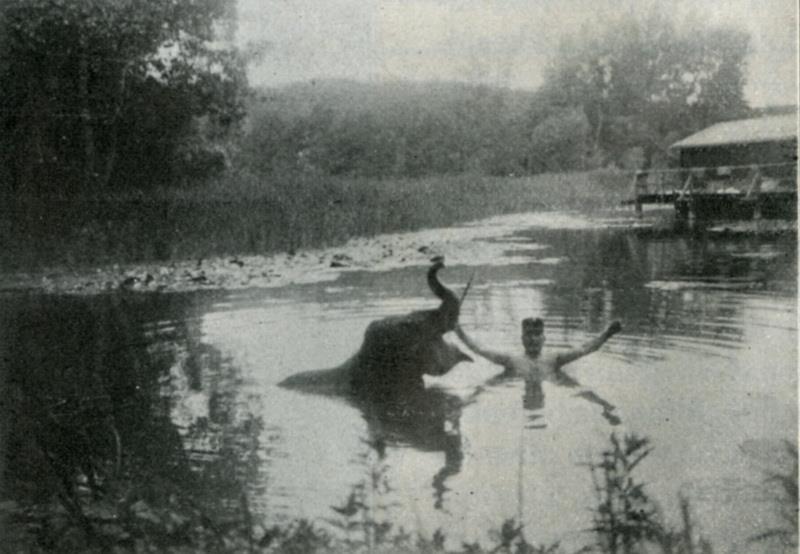
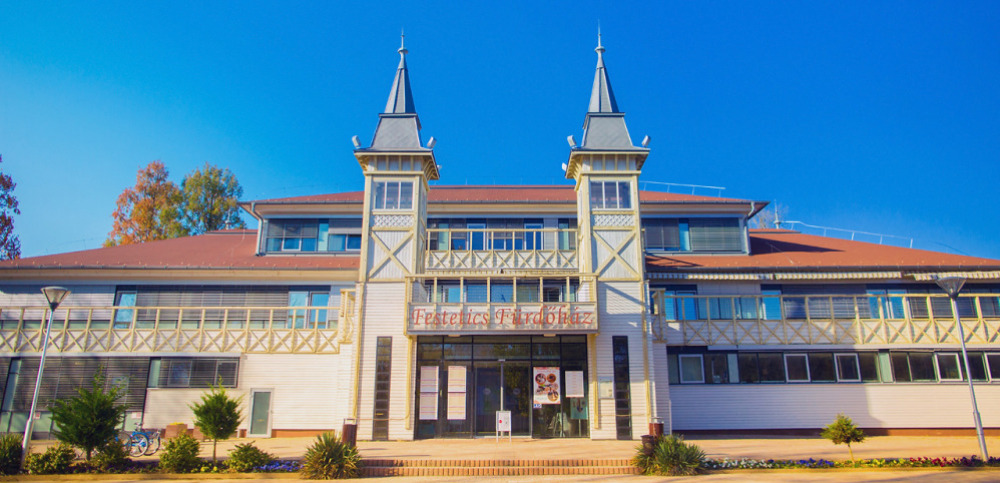
From 3 November 2025, Lake Hévíz can be accessed only via the entrance on Ady Street through the Festetics Day Spa.
Bathing is allowed only outdoors.
• Wellness area (the admission ticket includes the wellness usage fee)
• Vital Bar and Medio Buffet
• Covered rest areas in the section between Festetics Bathhouse and Vital Bar / Medio Buffet (“C” and “D” buildings)
• Outdoor shoreline section between the main entrance and the Festetics Day Spa (seasonally)
A limit is introduced on the accessible territories of the Lake Bath, which determines the simultaneous capacity of the facilities. For up‑to‑date information, please contact the information desk:
E‑mail: spaheviz@spaheviz.hu
Mobile: +36 30 959 1002
• Deák Square entrance
• Central Bathhouse (“A” building and “B” terrace)
• Northern water surface (between the “A” building and the Summer building)
Detailed information about the closure of the central Bathhouse (“A” building and “B” terrace) is available on www.spaheviz.hu.
Due to technical preparation work, phased closures on the water surface and shoreline are expected.
• Patient lift: at the outdoor seating pool (Vital Bar terrace, “C” Building )
Our staff provide assistance with the use of the patient lift.
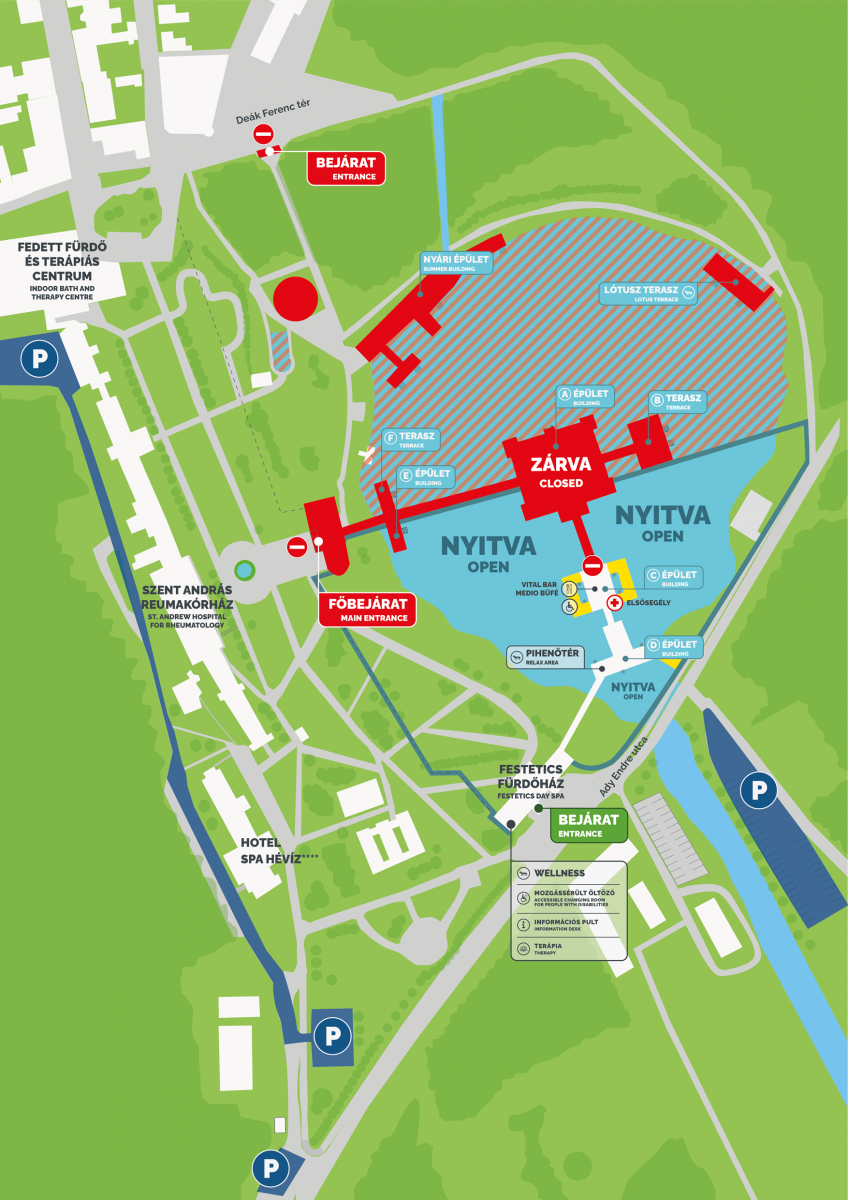
Yearly opening hours |
|||
| Opening | End of bathing and wellness time | Closing | |
| 2025.10.06. - 2025.10.25. | 9:00 | 17:00 | 17:30 |
| 2025.10.26. - 2026.02.08. | 8:30 | 16:00 | 16:30 |
| 2026.02.09. - 2026.03.29. | 9:00 | 17:00 | 17:30 |
Closing time on 24.12.2025 is at 14:00; on 31.12.2025 at 16:00. Opening time is at 11:00 on 01.01.2026.
Hévíz Lake Bath and Festetics Bathhouse price list
Valid from 03.11.2025 to 31.03.2026
2-hour admission + WELLNESS ACCESS |
|
| Valid only on the day of purchase – entitles to a one-time entry. Includes the use of the wellness area. An additional charge will be levied if the allotted time limit is exceeded. Additional time extension cannot be purchased after the time limit has expired. Admission for children under the age of 6 is free of charge. | |
| 2-hour admission | 3 000 HUF |
| 2-hour admission seniors - Available for individuals over the age of 60. Can be purchased upon prior presentation of a valid photo ID. | 2 500 HUF |
| 2-hour admission students - Available for individuals over the age of 14. Can be purchased upon prior presentation of a valid student card. | 2 500 HUF |
| 2-hour admission children - Available for children aged 6 to 14. | 1 500 HUF |
| 2-hour admission groups - Discounted 2-hour admission - available for groups of 20 people or more, if payed in one sum. | 2500 HUF/Person |
Memberships + WELLNESS ACCESS |
|
| 10-hour membership - Valid for 20 days (can be used on the day of purchase + 19 calendar days) - the pass grants entry twice per day. Includes the use of the wellness area. The deposit is refundable within 5 calendar days after the expiration date. | 13 000 Ft + 2 000 Ft deposit |
| 20-hour membership - Valid for 30 days (can be used on the day of purchase + 29 calendar days) - the pass grants entry twice per day. Includes the use of the wellness area. The deposit is refundable within 5 calendar days after the expiration date. | 23 000 Ft + 2 000 Ft deposit |
Other rates |
|
| + 1 hour extension - Usable for extending the 2-hour admission. Valid once per admission. | 1 500 HUF |
| Additional charge - For exceeding the allotted time limit, payable for every 30 minutes. | 1 000 HUF |
| Cloakroom - Operates seasonally - the fee applies per coat/package. | 300 HUF |
| Safety deposit box - Usage is free of charge. |
2000 HUF deposit |
| Swimring rental - Daily fee. | 700 HUF + 2 000 HUF deposit |
| Sauna towel | 500 HUF |
Online purchased tickets and gift vouchers can be redeemed at the information desk located in the Festetics Day Spa.
Gift vouchers purchased from 1 October 2025, can be redeemed between 1 April 2026 and 31 October 2026.
General information
- The depth of the lake is 2 to 38 m.
• We reserve the right to change prices and opening hours.
• The price of purchased tickets can not be refunded.
• Accepted means of payment: cash (HUF), bank card or SZÉP card.
• By purchasing admission to the lake area, visitors implicitly agree to adhere to the house rules.
• Admission for children under the age of 6 is free.
• Swimring rental is possible only with the purchase of a rental ticket and the payment of a deposit. The Bath refunds the deposit only, if the rented equipment is returned until the end of bathing time, on the day of rental. Payment is possible only in cash (in Hungarian Forint).
• The admission tickets include the use of the wellness area. Wellness and sauna services are available to individuals over 12 years of age only. For reasons of hygiene, one sauna towel is provided for each wellness admission.
• For more information, please contact the information counter at the Festetics Day Spa

